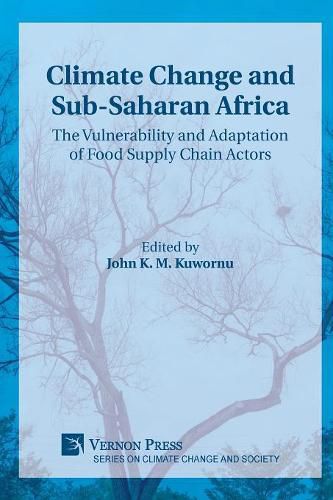Readings Newsletter
Become a Readings Member to make your shopping experience even easier.
Sign in or sign up for free!
You’re not far away from qualifying for FREE standard shipping within Australia
You’ve qualified for FREE standard shipping within Australia
The cart is loading…






This title is printed to order. This book may have been self-published. If so, we cannot guarantee the quality of the content. In the main most books will have gone through the editing process however some may not. We therefore suggest that you be aware of this before ordering this book. If in doubt check either the author or publisher’s details as we are unable to accept any returns unless they are faulty. Please contact us if you have any questions.
The adverse effects of climate change and climate variability have become some of the biggest environmental and socio-economic challenges for society, and for food supply chain actors, in particular. Serving as a serious inhibitor to the attainment of food security, climate change poses a fundamental threat to the availability, accessibility, stability and utilization of nutritious food and quality drinking water. The threat of this global phenomenon is not only apparent from the difficulties faced by all food supply chain actors, but is also felt acutely by households dependent on semi-subsistence agriculture. As evidenced by numerous studies conducted by the academic community, governmental and non-governmental organisations, climate change and climate variability will have disastrous effects on entire food supply chains across the world.
This edited volume looks to address: How vulnerable are food supply chain actors to climate change and climatic variability? What adaptation strategies are they adopting? How is the resilience of food supply chains being supported? Are they being financed and/or supported by international organizations to cope with climate change? And what governmental support are they receiving to help cope with climate change?
This book is an essential resource for students, lecturers, researchers, agribusinesses, marketing firms, agricultural institutions, climate change adaptation institutions, policymakers and many others with an interest in agricultural development and the global food industry.
$9.00 standard shipping within Australia
FREE standard shipping within Australia for orders over $100.00
Express & International shipping calculated at checkout
This title is printed to order. This book may have been self-published. If so, we cannot guarantee the quality of the content. In the main most books will have gone through the editing process however some may not. We therefore suggest that you be aware of this before ordering this book. If in doubt check either the author or publisher’s details as we are unable to accept any returns unless they are faulty. Please contact us if you have any questions.
The adverse effects of climate change and climate variability have become some of the biggest environmental and socio-economic challenges for society, and for food supply chain actors, in particular. Serving as a serious inhibitor to the attainment of food security, climate change poses a fundamental threat to the availability, accessibility, stability and utilization of nutritious food and quality drinking water. The threat of this global phenomenon is not only apparent from the difficulties faced by all food supply chain actors, but is also felt acutely by households dependent on semi-subsistence agriculture. As evidenced by numerous studies conducted by the academic community, governmental and non-governmental organisations, climate change and climate variability will have disastrous effects on entire food supply chains across the world.
This edited volume looks to address: How vulnerable are food supply chain actors to climate change and climatic variability? What adaptation strategies are they adopting? How is the resilience of food supply chains being supported? Are they being financed and/or supported by international organizations to cope with climate change? And what governmental support are they receiving to help cope with climate change?
This book is an essential resource for students, lecturers, researchers, agribusinesses, marketing firms, agricultural institutions, climate change adaptation institutions, policymakers and many others with an interest in agricultural development and the global food industry.